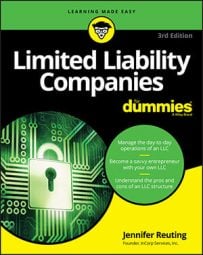Businesses don’t operate themselves — someone needs to manage them! You don’t have to decide immediately exactly who will manage the day-to-day operations of your business and what their specific roles will be, but most states require that you give a basic idea of how your company will be managed in the articles of organization.
Luckily, you need to decide between only two management options for your LLC:
Member-managed: The LLC’s members (the owners) also deal in the business’s day-to-day operations. If you select this option, all the members are also managers — you can’t prevent one member from getting involved while allowing the rest to manage the business. However, you can limit the power of individual member-managers (or groups of member-managers) in the operating agreement.
Manager-managed: A separate manager (or two or three or ten) handles the business’s day-to-day operations. This is a good choice if not all members want to manage and/or an outside person would be a good candidate. The benefits of manager management include flexibility — you can assign certain outside individuals as managers, now or in the future — alleviated confusion, and a break-up of the workload.
Just as the number of members an LLC can have is unlimited, your LLC can also have an unlimited number of managers, but choose wisely. Unless specifically restricted in the operating agreement managers have absolute authority to obligate the business to contracts, loans, debts, and so on. It takes only one manager to do so, and he can act without the knowledge of the other managers.
Therefore, unless you clearly limit that person’s authority, all the members must absolutely trust whoever is chosen as a manager.
A manager doesn’t have to be a person; it can also be another company or a trust. Sometimes there are benefits to setting up a separate company that acts as manager for your LLC. One such benefit of structuring your business this way is privacy — you can list the managing company’s name as manager instead of your own.
When the members manage
When an LLC is member-managed, all the owners are responsible for the day-to-day operations of the business. If you’re a small business without outside investors (who don’t have an operational role), then chances are your LLC is managed by its members.
However, if you, like most entrepreneurs, put everything you have into your start-up, then a partner slipping up and getting your company embroiled in lawsuits could be devastating.
If you’re a small business and you want to exclude certain members who have a tendency to make bad decisions, like using company funds for personal, non-business-related exploits and adventures, then you may want to severely limit that member’s management powers in the operating agreement or isolate that member from all management activities by making your LLC manager-managed and not electing that individual as a manager.
If your LLC is a larger company with a lot of members, you may want to think twice about choosing member management. Think about it — if you have 25 members and each member has a say in the day-to-day operations of the business, it will be a total mess! That’s like having 25 CEOs!
Not only is this setup unrealistic, but it will also lack credibility if your LLC is ever taken to court. Members don’t need to be managers in order to have basic voting powers over the company’s big decisions, and the beauty of an LLC is that you’re free to specify what qualifies as a big decision in the operating agreement.
If you choose member management, you may lose the benefit of charging order protection if you don’t take a few steps to protect it. If a creditor gets a charging order against your membership interests and those interests come with management rights, that creditor can use his management powers to distribute a good portion of the profits to himself to pay off the claim.
When separate managers manage
Your company is considered manager-managed if one of the following is true:
One or more of the managers of the company is not a member.
Not all members of the company manage the day-to-day details.
When you select manager management, you must choose at least one manager. The manager doesn’t even have to be a he or a she! You can select an entity (an LLC, corporation, limited partnership, and so on) to manage your LLC.
Why would you have separate managers manage? Maybe one of the members wants to remain a silent partner. He’s willing to risk his money but doesn’t want to be bothered with the everyday business decisions that the managers are confronted with.
Or say that none of the members has time to manage the business, so they want to hire an outside CEO who can do a better job than they ever could. In many situations, separate managers may make more sense for your LLC.
Manager-managed LLCs are commonly used in estate planning. You can give your children membership shares in the LLC every year while remaining the only manager of the LLC. While you’re alive, your children can’t make management decisions regarding the money but can receive profits from it (finally, a true gift that keeps on giving!). Then, when you pass away, they are elected as the new managers and have full rights over and use of the LLC’s assets.
When you have a manager-managed LLC, the Securities and Exchange Commission or your state securities division may determine that you are involved in the sale of securities if your members are investing in an LLC that they have no say in managing. This isn’t necessarily a bad thing. Just be sure to speak with a qualified securities lawyer before disallowing any of your investors decision-making power in the company’s operations.

